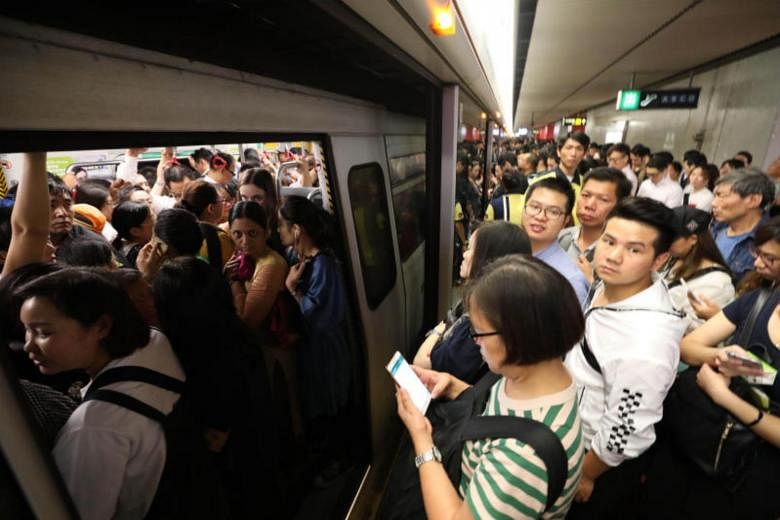HONG KONG - It was not the testing of a new signalling system that brought down four key arteries of Hong Kong's mass transit network on Tuesday (Oct 16), said the rail operator on Wednesday (Oct 17).
MTR Corporation's Tony Lee, chief of the company's operations engineering, told public broadcaster RTHK in a radio interview on Wednesday morning that based on preliminary findings, the likely cause of service breakdown was a software and settings issue.
His engineers and the signalling systems' supplier did an analysis of the data and found that the network's different signalling systems tried to send huge volumes of data to one another on Tuesday morning, and they were trying to synchronise.
Mr Lee said that the synchronisation was started by the computers of the different signalling systems without prompting. This kind of data synchronisation had not been seen before, but MTR believed it had something to do with the computer program and settings.
It was the first time that the different signalling systems had sent such huge volumes of data to one another, Mr Lee said. This drained the computers' resources and caused them to become unstable.
The preliminary findings will be sent to the supplier's French headquarters for further investigation.
Hong Kong's reliable train network was brought to its knees for six hours on Tuesday morning after what the rail operator described as an "unprecedented" signalling glitch that inconvenienced hundreds of thousands of commuters.
It noticed the signalling failure at about 5.30am on Tuesday and issued a red alert at 6.20am to inform relevant departments and other public transport providers about the expected disruption.
Throughout Tuesday morning, train services on four main lines - Island, Kwun Tong, Tsuen Wan and Tseung Kwan O - were brought to a crawl, unleashing commuter chaos in the financial hub. Normal train services resumed at about noon.
The company said on Tuesday that it would be checking if the testing of a new signalling system of the Tsuen Wan line had caused the service breakdown.
Mr Lee ruled it out in the radio interview.
"Initially, we believe that this had something to do with the computer program and its settings," he said.
"We cannot see that this incident had anything to do with the testing of the new signalling system, because at 4.30am that morning we had successfully switched back from the new system, to the existing system. We don't see any human error here."
He said that MTR engineers have isolated the signalling systems of the four affected lines to prevent a recurrence of Tuesday's breakdown.
Mr Lee said MTR will strengthen its maintenance in future.
Transport Secretary Frank Chan said on Tuesday that the government, MTR's biggest shareholder, would follow up on the "special" situation and decide if the train operator would face tougher penalties for the crippling service delay.
Under an agreement between MTR and the Hong Kong government, the operator needs to pay a fine if there are delays of more than 31 minutes, Bloomberg had reported.
A 10-hour service disruption on the Kwun Tong line last year, which was also the result of a signalling fault, led to a HK$2 million (S$353,000) penalty.
Local media reported that MTR has paid some HK$85 million in fines since 2012 in the light of 40 similar incidents.
MTR trains carry about 5.8 million passengers on a weekday.


